爱因斯坦《论教育》
论教育(爱因斯坦)
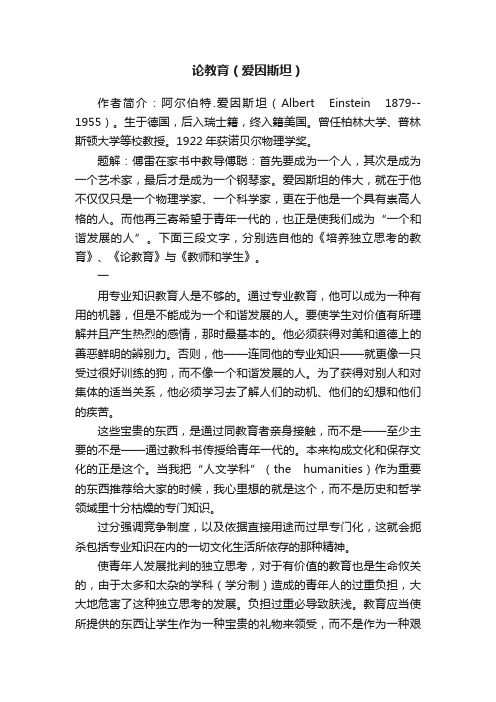
论教育(爱因斯坦)作者简介:阿尔伯特.爱因斯坦(Albert Einstein1879--1955)。
生于德国,后入瑞士籍,终入籍美国。
曾任柏林大学、普林斯顿大学等校教授。
1922年获诺贝尔物理学奖。
题解:傅雷在家书中教导傅聪:首先要成为一个人,其次是成为一个艺术家,最后才是成为一个钢琴家。
爱因斯坦的伟大,就在于他不仅仅只是一个物理学家、一个科学家,更在于他是一个具有崇高人格的人。
而他再三寄希望于青年一代的,也正是使我们成为“一个和谐发展的人”。
下面三段文字,分别选自他的《培养独立思考的教育》、《论教育》与《教师和学生》。
一用专业知识教育人是不够的。
通过专业教育,他可以成为一种有用的机器,但是不能成为一个和谐发展的人。
要使学生对价值有所理解并且产生热烈的感情,那时最基本的。
他必须获得对美和道德上的善恶鲜明的辨别力。
否则,他——连同他的专业知识——就更像一只受过很好训练的狗,而不像一个和谐发展的人。
为了获得对别人和对集体的适当关系,他必须学习去了解人们的动机、他们的幻想和他们的疾苦。
这些宝贵的东西,是通过同教育者亲身接触,而不是——至少主要的不是——通过教科书传授给青年一代的。
本来构成文化和保存文化的正是这个。
当我把“人文学科”(the humanities)作为重要的东西推荐给大家的时候,我心里想的就是这个,而不是历史和哲学领域里十分枯燥的专门知识。
过分强调竞争制度,以及依据直接用途而过早专门化,这就会扼杀包括专业知识在内的一切文化生活所依存的那种精神。
使青年人发展批判的独立思考,对于有价值的教育也是生命攸关的,由于太多和太杂的学科(学分制)造成的青年人的过重负担,大大地危害了这种独立思考的发展。
负担过重必导致肤浅。
教育应当使所提供的东西让学生作为一种宝贵的礼物来领受,而不是作为一种艰苦的任务要他去负担。
二在每项成绩背后都有着一种推动力,它是成绩的基础,反过来,这种推动力也通过任务的完成而得到加强和滋养。
爱因斯坦的教育观
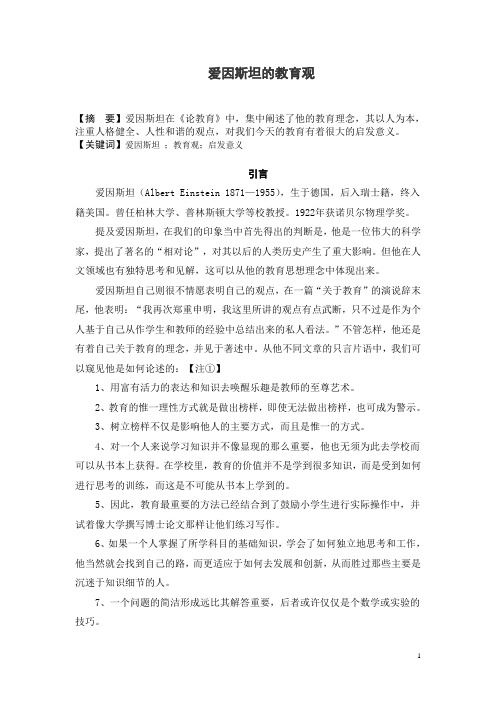
爱因斯坦的教育观【摘要】爱因斯坦在《论教育》中,集中阐述了他的教育理念,其以人为本,注重人格健全、人性和谐的观点,对我们今天的教育有着很大的启发意义。
【关键词】爱因斯坦;教育观;启发意义引言爱因斯坦(Albert Einstein 1871—1955),生于德国,后入瑞士籍,终入籍美国。
曾任柏林大学、普林斯顿大学等校教授。
1922年获诺贝尔物理学奖。
提及爱因斯坦,在我们的印象当中首先得出的判断是,他是一位伟大的科学家,提出了著名的“相对论”,对其以后的人类历史产生了重大影响。
但他在人文领域也有独特思考和见解,这可以从他的教育思想理念中体现出来。
爱因斯坦自己则很不情愿表明自己的观点,在一篇“关于教育”的演说辞末尾,他表明:“我再次郑重申明,我这里所讲的观点有点武断,只不过是作为个人基于自己从作学生和教师的经验中总结出来的私人看法。
”不管怎样,他还是有着自己关于教育的理念,并见于著述中。
从他不同文章的只言片语中,我们可以窥见他是如何论述的:【注①】1、用富有活力的表达和知识去唤醒乐趣是教师的至尊艺术。
2、教育的惟一理性方式就是做出榜样,即使无法做出榜样,也可成为警示。
3、树立榜样不仅是影响他人的主要方式,而且是惟一的方式。
4、对一个人来说学习知识并不像显现的那么重要,他也无须为此去学校而可以从书本上获得。
在学校里,教育的价值并不是学到很多知识,而是受到如何进行思考的训练,而这是不可能从书本上学到的。
5、因此,教育最重要的方法已经结合到了鼓励小学生进行实际操作中,并试着像大学撰写博士论文那样让他们练习写作。
6、如果一个人掌握了所学科目的基础知识,学会了如何独立地思考和工作,他当然就会找到自己的路,而更适应于如何去发展和创新,从而胜过那些主要是沉迷于知识细节的人。
7、一个问题的简洁形成远比其解答重要,后者或许仅仅是个数学或实验的技巧。
8、学习昨天,生活今天,希望明天,重要的是不断地问为什么。
9、提出新问题,新的可能性,从新角度认识老问题,都需要富于创造的想象力,并标志着科学的实际进展。
爱因斯坦《论教育》
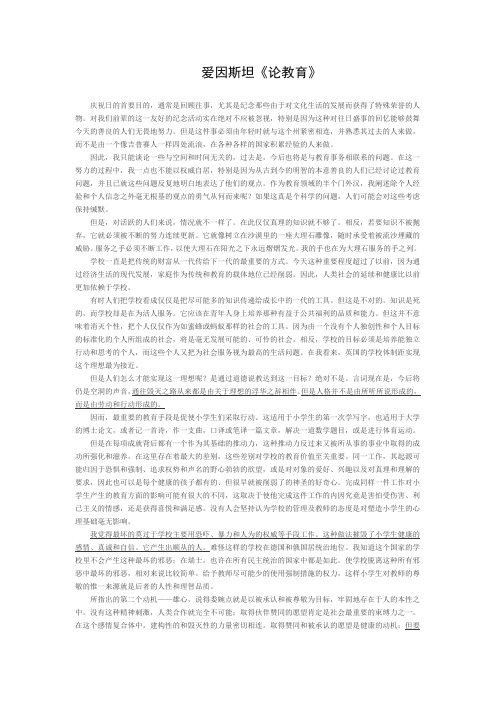
爱因斯坦《论教育》庆祝日的首要目的,通常是回顾往事,尤其是纪念那些由于对文化生活的发展而获得了特殊荣誉的人物。
对我们前辈的这一友好的纪念活动实在绝对不应被忽视,特别是因为这种对往日盛事的回忆能够鼓舞今天的善良的人们无畏地努力。
但是这件事必须由年轻时就与这个州紧密相连,并熟悉其过去的人来做,而不是由一个像吉普赛人一样四处流浪,在各种各样的国家积累经验的人来做。
因此,我只能谈论一些与空间和时间无关的,过去是,今后也将是与教育事务相联系的问题。
在这一努力的过程中,我一点也不能以权威自居,特别是因为从古到今的明智的本意善良的人们已经讨论过教育问题,并且已就这些问题反复地明白地表达了他们的观点。
作为教育领域的半个门外汉,我阐述除个人经验和个人信念之外毫无根基的观点的勇气从何而来呢?如果这真是个科学的问题,人们可能会对这些考虑保持缄默。
但是,对活跃的人们来说,情况就不一样了。
在此仅仅真理的知识就不够了。
相反,若要知识不被抛弃,它就必须被不断的努力连续更新。
它就像树立在沙漠里的一座大理石雕像,随时承受着被流沙埋藏的威胁。
服务之手必须不断工作,以使大理石在阳光之下永远熠熠发光。
我的手也在为大理石服务的手之列。
学校一直是把传统的财富从一代传给下一代的最重要的方式。
今天这种重要程度超过了以前,因为通过经济生活的现代发展,家庭作为传统和教育的载体地位已经削弱。
因此,人类社会的延续和健康比以前更加依赖于学校。
有时人们把学校看成仅仅是把尽可能多的知识传递给成长中的一代的工具。
但这是不对的。
知识是死的,而学校却是在为活人服务。
它应该在青年人身上培养那种有益于公共福利的品质和能力。
但这并不意味着消灭个性,把个人仅仅作为如蜜蜂或蚂蚁那样的社会的工具。
因为由一个没有个人独创性和个人目标的标准化的个人所组成的社会,将是毫无发展可能的、可怜的社会。
相反,学校的目标必须是培养能独立行动和思考的个人,而这些个人又把为社会服务视为最高的生活问题。
《论教育》——绪言
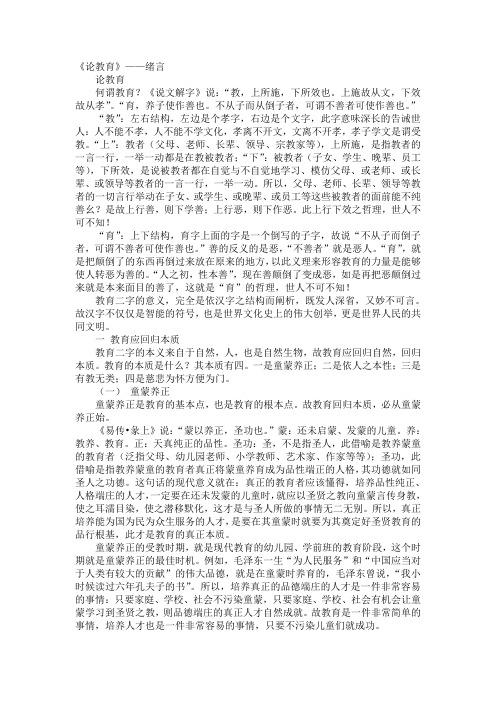
《论教育》——绪言论教育何谓教育?《说文解字》说:“教,上所施,下所效也。
上施故从文,下效故从孝”。
“育,养子使作善也。
不从子而从倒子者,可谓不善者可使作善也。
”“教”:左右结构,左边是个孝字,右边是个文字,此字意味深长的告诫世人:人不能不孝,人不能不学文化,孝离不开文,文离不开孝,孝子学文是谓受教。
“上”:教者(父母、老师、长辈、领导、宗教家等),上所施,是指教者的一言一行,一举一动都是在教被教者;“下”:被教者(子女、学生、晚辈、员工等),下所效,是说被教者都在自觉与不自觉地学习、模仿父母、或老师、或长辈、或领导等教者的一言一行,一举一动。
所以,父母、老师、长辈、领导等教者的一切言行举动在子女、或学生、或晚辈、或员工等这些被教者的面前能不纯善幺?是故上行善,则下学善;上行恶,则下作恶。
此上行下效之哲理,世人不可不知!“育”:上下结构,育字上面的字是一个倒写的子字,故说“不从子而倒子者,可谓不善者可使作善也。
”善的反义的是恶,“不善者”就是恶人。
“育”,就是把颠倒了的东西再倒过来放在原来的地方,以此义理来形容教育的力量是能够使人转恶为善的。
“人之初,性本善”,现在善颠倒了变成恶,如是再把恶颠倒过来就是本来面目的善了,这就是“育”的哲理,世人不可不知!教育二字的意义,完全是依汉字之结构而阐析,既发人深省,又妙不可言。
故汉字不仅仅是智能的符号,也是世界文化史上的伟大创举,更是世界人民的共同文明。
一教育应回归本质教育二字的本义来自于自然,人,也是自然生物,故教育应回归自然,回归本质。
教育的本质是什么?其本质有四。
一是童蒙养正;二是依人之本性;三是有教无类;四是慈悲为怀方便为门。
(一)童蒙养正童蒙养正是教育的基本点,也是教育的根本点。
故教育回归本质,必从童蒙养正始。
《易传•彖上》说:“蒙以养正,圣功也。
”蒙:还未启蒙、发蒙的儿童。
养:教养、教育。
正:天真纯正的品性。
圣功:圣,不是指圣人,此借喻是教养蒙童的教育者(泛指父母、幼儿园老师、小学教师、艺术家、作家等等);圣功,此借喻是指教养蒙童的教育者真正将蒙童养育成为品性端正的人格,其功德就如同圣人之功德。
《论教育》爱因斯坦,的读书笔记摘抄大全

教育是人类社会中至关重要的一环,它不仅关乎个体的成长和发展,更关系到整个社会的进步和发展。
爱因斯坦作为一位杰出的科学家,在他的一生中对教育也有着深刻的思考和见解。
本篇文章将根据爱因斯坦的读书笔记摘抄,从浅入深地探讨教育的重要性,以及对教育的个人理解和观点。
一、教育的定义1.教育的本质爱因斯坦在其读书笔记中提到:“真正的教育应是培养创造力和独立思考能力。
”教育不仅仅是灌输知识,更重要的是培养学生的思维能力和创新意识。
这种培养不仅仅是单向的,更应该是双向的,即教师和学生之间的互相启发和共同成长。
2.教育的目标在爱因斯坦的观点中,教育的最终目标是“培养一批有独立思考能力和创造力的人才,而不是机械地传授知识。
”这种目标的确定,对于当前教育也有着深远的意义。
现今社会已经不再缺乏知识,决定一个人成功与否的是其创造力和创新能力。
二、教育的现状1.教育的单向输送在实际教育中,很多教育机构只重视知识的传授和死记硬背,忽视了学生的思维能力和创新能力。
这种单向的教育模式不仅影响了学生的个人发展,也影响了整个社会的进步。
2.教育的功利化由于社会的竞争压力,很多教育机构开始过分强调学生的应试能力,而忽视了对学生综合素质的培养。
这种功利化的教育方式,不仅限制了学生的发展,也限制了整个社会的进步。
三、教育的未来1.重视独立思考未来的教育应该更加重视学生的独立思考能力,引导学生从不同的角度去思考问题,培养他们解决问题的能力。
教师也应该转变角色,做学生思维的引导者,而不是简单地灌输知识。
2.注重创新意识未来的教育应该更加注重学生的创新意识,给予学生更多的自由空间,让他们有更多的机会去实践和创新。
这种教育方式不仅能够激发学生的学习兴趣,也能够让他们更好地适应未来社会的发展。
个人观点和理解在我看来,教育的重要性不言而喻。
而爱因斯坦的观点深刻地启发了我对教育的思考。
教育不仅仅是为了获取知识,更重要的是为了培养学生的思维能力和创新意识。
读《论教育》有感
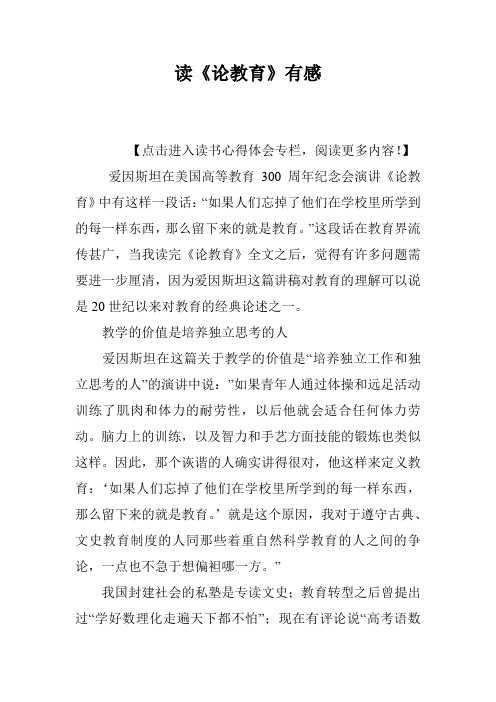
读《论教育》有感【点击进入读书心得体会专栏,阅读更多内容!】爱因斯坦在美国高等教育300周年纪念会演讲《论教育》中有这样一段话:“如果人们忘掉了他们在学校里所学到的每一样东西,那么留下来的就是教育。
”这段话在教育界流传甚广,当我读完《论教育》全文之后,觉得有许多问题需要进一步厘清,因为爱因斯坦这篇讲稿对教育的理解可以说是20世纪以来对教育的经典论述之一。
教学的价值是培养独立思考的人爱因斯坦在这篇关于教学的价值是“培养独立工作和独立思考的人”的演讲中说:”如果青年人通过体操和远足活动训练了肌肉和体力的耐劳性,以后他就会适合任何体力劳动。
脑力上的训练,以及智力和手艺方面技能的锻炼也类似这样。
因此,那个诙谐的人确实讲得很对,他这样来定义教育:‘如果人们忘掉了他们在学校里所学到的每一样东西,那么留下来的就是教育。
’就是这个原因,我对于遵守古典、文史教育制度的人同那些着重自然科学教育的人之间的争论,一点也不急于想偏袒哪一方。
”我国封建社会的私塾是专读文史;教育转型之后曾提出过“学好数理化走遍天下都不怕”;现在有评论说“高考语数外”偏重于文科,莫衷一是。
而爱因斯坦“一点也不急于想偏袒哪一方”,他认为“独立工作和独立思考”素质能力的形成是最重要的。
“一个由没有个人独创性和个人志愿的规格统一的个人所组成的社会,将是一个没有发展可能的不幸的社会。
相反地,学校的目标应当是培养独立行动和独立思考的个人,不过他们要把为社会服务看做是自己人生的最高目的。
”实际上,有了“独立工作和独立思考”的素质,无论从事什么领域的工作都会游刃有余,并不完全要书本知识基础有多雄厚。
学校教学最终“剩下的”是能力素质。
在今天的教育语境下,如何理解这一段话至关重要,因为它涉及教学价值。
这些年,经合组织和欧盟理事会的研究报告中提出“核心素养”。
经合组织1997年启动了“素养的界定与遴选:理论和概念基础”。
于是“核心素养”成为热门话题。
笔者以为“核心素养”所涉及的正是爱因斯坦所提出“人们忘记了在学校所学过的每一件事后剩下的”东西,“剩下的”这些东西是课程教学之外获得的能力。
爱因斯坦《论教育》英文

爱因斯坦《论教育》英文On Educationby Albert EinsteinExcerpts from an address by Albert Einstein to the State University of New York at Albany, on the occasion of the celebration of the tercentenary of highereducation in America, 15th October, 1931. Reference - “Ideas and Opinions” by Albert Einstein.A day of celebration generally is in the first place dedicated to retrospect, especially to the memory of personages who have gained special distinction for the development of the cultural life. This friendly service for our predecessors must indeed not be neglected, particularly as such a memory of the best of the past is proper to simulate the well-disposed of today to a courageous effort. But this should be done by someone who, from his youth, has been connected with this State and is familiar with its past, not by one who like a gypsy has wondered about and gathered his experiences in all kinds of countries.Thus there is nothing else left for me but to speak about suchquestions as, independently of space and time, always have been and will be connected with educational matters. In this attempt I cannot lay any claim to being an authority, especially as intelligent and well-meaning men of all times have dealt with educational problems and have certainly repeatedly expressed their view clearly about these matters. From what source shall I, as a partiallay man in the realm of pedagogy, derive courage to expound opinions with nofoundations except personal experience and personal conviction? If it were really a scientific matter, one would probably be tempted to silence by such considerations.However, with the affairs of active human beings it is different. Here knowledge of truth alone does not suffice; on the contrary this knowledge must continually be renewed by ceaseless effort, if it is not to be lost. It resembles a statue of marble which stands in the desert and is continuously threatened with burial by the shifting-sand. The hands of service must ever be at work, in order that the marble continue lastingly to shine in the sun. T o these serving hands mine also shall belong.The school has always been the most important means of transferring the wealth of tradition from one generation to the next. This applies today in an even higher degree than in former times for, through modern development of the economic life, the family as bearer oftradition and education has been weakened. The continuance and health of human society is therefore in a still higher degree dependent on the school than formerly.Sometimes one sees in the school simply the instrument for transferring a certain maximum quantity of knowledge to the growing generation. But that is not right. Knowledge is dead; the school, however, serves the living. It should develop in the young individuals those qualities and capabilities which are of value for the welfare of the commonwealth. But that does not mean that individuality should be destroyed and the individual become a mere tool of the community, like a bee or an ant. For a community of standardized individuals without personal originality and personal aims would be a poor community without possibilities for development. On the contrary, the aim must be the training of independently acting and thinking individuals, who, however, see in the service of the community their highest life problem. As far as I can judge, the English school system comes nearest to the realization of this ideal.But how shall one try to attain this ideal? Should one perhaps try to realize this aim by moralizing? Not at all. Words are and remain an empty sound, and the road to perdition has ever been accompanied by lipservice to an ideal. But personalities are not formed by what is heard and said, but by labor and activity.The most important method of education accordingly always has consisted of that in which the pupil was urged to actual performance. This applies as well to the first attempts at writing of the primary boy as to the doctor’s thesis on graduation from the university, or as to the mere memorizing of a poem, the writing of a composition, the interpretation and translation of a text, the solving of a mathematical problem or the practice of physical sport.But behind every achievement exists the motivation which is at the foundation of it and which in turn is strengthened and nourished by the accomplishment of the undertaking. Here there are the greatest differences and they are of greatest importance to the educational value of the school. The same work may owe its origin to fear and compulsion, ambitious desire for authority and distinction, or loving interest in the object and a desire for truth and understanding, and thus to that divine curiosity which every healthy child possesses, but which so often early is weakened. The educational influence which is exercised upon the pupil by the accomplishment of one and the same work may be widely different, depending upon whether fear of hurt, egoistic passion or desirefor pleasure and satisfaction are at the bottom of this work. And nobody will maintain that the administration of the school and the attitude of the teachers does not have an influence upon the molding of the psychological foundation for pupils.To me the worst thing seems to be for a school principally to work with methods of fear, force and artificial authority. Such treatment destroys the sound sentiments, the sincerity and the self-confidence of the pupil. It produces the submissive subject. It is no wonder that such schools are the rule in Germany and Russia. I know that the schools in this country are free from this worst evil; this also is so in Switzerland and probably in all democratically governed countries. It is comparatively simple to keep the school free from this worst of all evils. Give into the power of the teacher the fewest possible coercive measures, so that the only source of the pupil’s respect for the teacher is the human and intellectual qualities of the latter.The second-named motive, ambition or, in milder terms, the aiming at recognition and consideration, lies firmly fixed in human nature. With absence of mental stimulus of this kind, human cooperation would be entirely impossible; the desire for the appr oval of one’s fellowman certainly is one of the most important binding powers of society. In thiscomplex of feelings, constructive and destructive forces lie closely together. Desire for approval and recognition is a healthy motive, but the desire to be acknowledged as better, stronger or more intelligent than a fellow being or fellow scholar easily leads to an excessively egoistic psychological adjustment, which may become injurious for the individual and for the community. Therefore the school and the teacher must guard against employing the easy method of creating individual ambition, in order to induce the pupils to diligent work.Darwin's theory of the struggle for existence and the selectivity connected with it has by many people been cited as authorization of the encouragement of the spirit of competition. Some people also in such a way have tried to prove pseudoscientifically the necessity of the destructive economic struggle of competition between individuals. But this is wrong, because man owes his strength in the struggle for existence to the fact that he is a socially living animal. As little as a battle between single ants of an ant hill is essential for survival, just so little is this the case with the individual members of a human community.Therefore one should guard against preaching to the young man success in the customary sense as the aim of life. For a successful man is he who receives a great deal from his fellowmen, usually incomparablymore than corresponds to his service to them. The value of a man, however, should be seen in what he gives and not in what he is able to receive.The most important motive for work in the school and in life is the pleasure in work, pleasure in its result and the knowledge of the value of the result to the community. In the awakening and strengthening of these psychological forces in the young man, I see the most important task given by the school. Such a psychological foundation alone leads to a joyous desire for the highest possessions of men, knowledge and artistlike workmanship.The awakening of these productive psychological powers is certainly less easy than the practice of force or the awakening of individual ambition but is the more valuable for it. The point is to develop the childlike inclination for play and the childlike desire for recognition and to guide the child over to important fields upon the desire for successful activity and acknowledgment. If the school succeeds in working successfully from such points of view, it will be highly honored by the rising generation and the tasks given by the school will be submitted to as a sort of gift. I have known children who preferred schooltime to vacation.Such a school demands from the teacher that he be a kind of artist in his province. What can be done that this spirit be gained in the school? For this there is just as little a universal remedy as there is for an individual to remain well. But there are certain necessary conditions which can be met. First, teachers should grow up in such schools. Second, the teacher should be given extensive liberty in the selection of the material to be taught and the methods of teaching employed by him. For it is true also of him that pleasure in the shaping of his work is killed by force and exterior pressure.If you have followed attentively my meditations up to this point, you will probably wonder about one thing. I have spoken fully about in what spirit, according to my opinion, youth should be instructed. But I have said nothing yet about the choice of subjects for instruction, nor about the method of teaching. Should language predominate or technical education in science?To this I answer: In my opinion all this is of secondary importance. If a young man has trained his muscles and physical endurance by gymnastics and walking, he will later be fitted for every physical work. This is also analogous to the training of the mind and the exercising ofthe mental and manual skill. Thus the wit was not wrong who defined education in this way: "Education is that which remains, if one has forgotten everything he learned in school. "For this reason I am not at all anxious to take sides in the struggle between the followers of the classical philologic-historical education and the education more devoted to natural science.On the other hand, I want to oppose the idea that the school has to teach directly that special knowledge and those accomplishments which one has to use later directly in life. The demands of life are much too manifold to let such a specialized training in school appear possible. Apart from that, it seems to me, moreover, objectionable to treat the individual like a dead tool. The school should always have as its aim that the young man leave it as a harmonious personality, not as a specialist. This in my opinion is true in a certain sense even for technical schools, whose students will devote themselves to a quite definite profession. The development of general ability for independent thinking and judgment should always be placed foremost, not the acquisition of special knowledge. If a person masters the fundamentals of his subject and has learned to think and work independently, he will surely find his way and besides will better be able to adapt himself to progress and changes than the person whose training principally consists in the acquiring of detailedknowledge.Finally, I wish to emphasize once more that what has been said here in a somewhat categorical form does not claim to mean more than the personal opinion of a man, which is founded upon nothing but his own personal experience, which he has gathered as a student and as a teacher.。
爱因斯坦——论教育
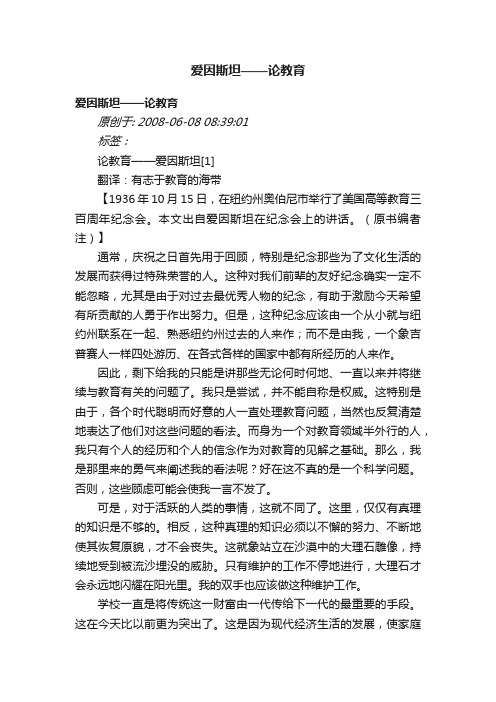
爱因斯坦——论教育爱因斯坦——论教育原创于: 2008-06-08 08:39:01标签:论教育——爱因斯坦[1]翻译:有志于教育的海带【1936年10月15日,在纽约州奥伯尼市举行了美国高等教育三百周年纪念会。
本文出自爱因斯坦在纪念会上的讲话。
(原书编者注)】通常,庆祝之日首先用于回顾,特别是纪念那些为了文化生活的发展而获得过特殊荣誉的人。
这种对我们前辈的友好纪念确实一定不能忽略,尤其是由于对过去最优秀人物的纪念,有助于激励今天希望有所贡献的人勇于作出努力。
但是,这种纪念应该由一个从小就与纽约州联系在一起、熟悉纽约州过去的人来作;而不是由我,一个象吉普赛人一样四处游历、在各式各样的国家中都有所经历的人来作。
因此,剩下给我的只能是讲那些无论何时何地、一直以来并将继续与教育有关的问题了。
我只是尝试,并不能自称是权威。
这特别是由于,各个时代聪明而好意的人一直处理教育问题,当然也反复清楚地表达了他们对这些问题的看法。
而身为一个对教育领域半外行的人,我只有个人的经历和个人的信念作为对教育的见解之基础。
那么,我是那里来的勇气来阐述我的看法呢?好在这不真的是一个科学问题。
否则,这些顾虑可能会使我一言不发了。
可是,对于活跃的人类的事情,这就不同了。
这里,仅仅有真理的知识是不够的。
相反,这种真理的知识必须以不懈的努力、不断地使其恢复原貌,才不会丧失。
这就象站立在沙漠中的大理石雕像,持续地受到被流沙埋没的威胁。
只有维护的工作不停地进行,大理石才会永远地闪耀在阳光里。
我的双手也应该做这种维护工作。
学校一直是将传统这一财富由一代传给下一代的最重要的手段。
这在今天比以前更为突出了。
这是因为现代经济生活的发展,使家庭作为传统和教育的载体功能被削弱了。
因此,现在比以前,人类社会的持续性和健康在更高程度上依赖于学校。
有时,人们仅仅把学校作为传授最大量知识给下一代的工具。
这是不对的。
知识是死的,学校却是为活人服务的。
学校应该培养青年人对人民的幸福有价值的品质和能力。
论教育(英)-Einstein
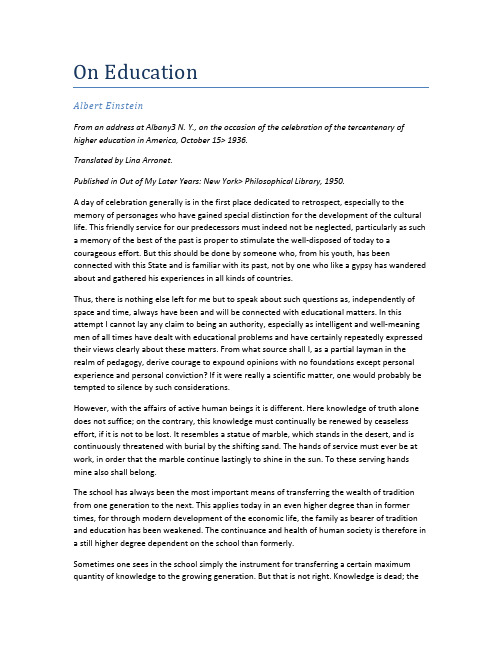
On EducationAlbert EinsteinFrom an address at Albany3 N. Y., on the occasion of the celebration of the tercentenary of higher education in America, October 15> 1936.Translated by Lina Arronet.Published in Out of My Later Years: New York> Philosophical Library, 1950.A day of celebration generally is in the first place dedicated to retrospect, especially to the memory of personages who have gained special distinction for the development of the cultural life. This friendly service for our predecessors must indeed not be neglected, particularly as such a memory of the best of the past is proper to stimulate the well-disposed of today to a courageous effort. But this should be done by someone who, from his youth, has been connected with this State and is familiar with its past, not by one who like a gypsy has wandered about and gathered his experiences in all kinds of countries.Thus, there is nothing else left for me but to speak about such questions as, independently of space and time, always have been and will be connected with educational matters. In this attempt I cannot lay any claim to being an authority, especially as intelligent and well-meaning men of all times have dealt with educational problems and have certainly repeatedly expressed their views clearly about these matters. From what source shall I, as a partial layman in the realm of pedagogy, derive courage to expound opinions with no foundations except personal experience and personal conviction? If it were really a scientific matter, one would probably be tempted to silence by such considerations.However, with the affairs of active human beings it is different. Here knowledge of truth alone does not suffice; on the contrary, this knowledge must continually be renewed by ceaseless effort, if it is not to be lost. It resembles a statue of marble, which stands in the desert, and is continuously threatened with burial by the shifting sand. The hands of service must ever be at work, in order that the marble continue lastingly to shine in the sun. To these serving hands mine also shall belong.The school has always been the most important means of transferring the wealth of tradition from one generation to the next. This applies today in an even higher degree than in former times, for through modern development of the economic life, the family as bearer of tradition and education has been weakened. The continuance and health of human society is therefore in a still higher degree dependent on the school than formerly.Sometimes one sees in the school simply the instrument for transferring a certain maximum quantity of knowledge to the growing generation. But that is not right. Knowledge is dead; theschool, however, serves the living. It should develop in the young individuals those qualities and capabilities which are of value for the welfare of the commonwealth. But that does not mean that individuality should be destroyed and the individual become a mere tool of the community, like a bee or an ant. For a community of standardized individuals without personal originality and personal aims would be a poor community without possibilities for development. On the contrary, the aim must be the training o£ independently acting and thinking individuals, who, however, see in the service of the community their highest life problem. So far as I can judge, the English school system comes nearest to the realization of this ideal.But how shall one try to attain this ideal? Should one perhaps try to realize this aim by moralizing? Not at all. Words are and remain an empty sound, and the road to perdition has ever been accompanied by lip service to an ideal. But personalities are not formed by what is heard and said, but by labor and activity.The most important method of education accordingly always has consisted of that in which the pupil was urged to actual performance. This applies as well to the first attempts at writing of the primary boy as to the doctor's thesis on graduation from the university, or as to the mere memorizing of a poem, the writing of a composition, the interpretation, and translation of a text, the solving of a mathematical problem or the practice of physical sport.But behind every achievement exists the motivation which is at the foundation of it and which in turn is strengthened and nourished by the accomplishment of the undertaking. Here there are the greatest differences and they are of greatest importance to the educational value of the school. The same work may owe its origin to fear and compulsion, ambitious desire for authority and distinction, or loving interest in the object and a desire for truth and understanding, and thus to that divine curiosity which every healthy child possesses, but which so often is weakened early. The educational influence, which is exercised upon the pupil by the accomplishment of one and the same work may be widely different, depending upon whether fear of hurt, egoistic passion, or desire for pleasure and satisfaction is at the bottom of this work. And nobody will maintain that the administration of the school and the attitude of the teachers do not have an influence upon the molding of the psychological foundation for pupils.To me the worst thing seems to be for a school principally to work with methods of fear, force, and artificial authority. Such treatment destroys the sound sentiments, the sincerity, and the self-confidence of the pupil. It produces the submissive subject. It is no wonder that such schools are the rule in Germany and Russia. I know that the schools in this country are free from this worst evil; this also is so in Switzerland and probably in all democratically governed countries. It is comparatively simple to keep the school free from this worst of all evils. Give into the power of the teacher the fewest possible coercive measures, so that the only source of the pupil's respect for the teacher is the human and intellectual qualities of the latter.The second-named motive, ambition or, in milder terms, the aiming at recognition and consideration, lies firmly fixed in human nature. With absence of mental stimulus of this kind,human cooperation would be entirely impossible; the desire for the approval of one's fellow-man certainly is one of the most important binding powers of society. In this complex of feelings, constructive and destructive forces lie closely together. Desire for approval and recognition is a healthy motive; but the desire to be acknowledged as better, stronger, or more intelligent than a fellow being or fellow scholar easily leads to an excessively egoistic psychological adjustment, which may become injurious for the individual and for the community. Therefore, the school and the teacher must guard against employing the easy method of creating individual ambition, in order to induce the pupils to diligent work.Darwin's theory of the struggle for existence and the selectivity connected with it has by many people been cited as authorization of the encouragement of the spirit of competition. Some people also in such a way have tried to prove pseudo-scientifically the necessity of the destructive economic struggle of competition between individuals. But this is wrong, because man owes his strength in the struggle for existence to the fact that he is a socially living animal. As little as a battle between single ants of an ant hill is essential for survival, just so little is this the case with the individual members of a human community.Therefore, one should guard against preaching to the young man success in the customary sense as the aim of life. For a successful man is he who receives a great deal from his fellowmen, usually incomparably more than corresponds to his service to them. The value of a man, however, should be seen in what he gives and not in what he is able to receive.The most important motive for work in the school and in life is the pleasure in work, pleasure in its result, and the knowledge of the value of the result to the community. In the awakening and strengthening of these psychological forces in the young man, I see the most important task given by the school. Such a psychological foundation alone leads to a joyous desire for the highest possessions of men, knowledge and artist-like workmanship.The awakening of these productive psychological powers is certainly less easy than the practice o£ force or the awakening of individual ambition but is the more valuable for it. The point is to develop the childlike inclination for play and the childlike desire for recognition and to guide the child over to important fields for society; it is that education which in the main is founded upon the desire for successful activity and acknowledgment. If the school succeeds in working successfully from such points of view, it will be highly honored by the rising generation and the tasks given by the school will be submitted to as a sort of gift. I have known children who preferred school-time to vacation.Such a school demands from the teacher that he be a kind of artist in his province. What can be done that this spirit be gained in the school? For this there is just as little a universal remedy as there is for an individual to remain well. But there are certain necessary conditions which can be met. First, teachers should grow up in such schools. Second, the teacher should be given extensive liberty in the selection of the material to be taught and the methods of teachingemployed by him. For it is true also of him that pleasure in the shaping of his work is killed by force and exterior pressure.If you have followed attentively my meditations up to this point, you will probably wonder about one thing. I have spoken fully about in what spirit, according to my opinion, youth should be instructed. But I have said nothing yet about the choice of subjects for instruction, nor about the method of teaching. Should language predominate or technical education in science?To this I answer: in my opinion all this is of secondary importance. If a young man has trained his muscles and physical endurance by gymnastics and walking, he will later be fitted for every physical work. This is also analogous to the training of the mind and the exercising of the mental and manual skill. Thus, the wit was not wrong who defined education in this way: "Education is that which remains, if one has forgotten everything he learned in school." For this reason, I am not at all anxious to take sides in the struggle between the followers of the classical philologic-historical education and the education more devoted to natural science.On the other hand, I want to oppose the idea that the school has to teach directly that special knowledge and those accomplishments, which one has to use later directly in life. The demands of life are much too manifold to let such a specialized training in school appear possible. Apart from that, it seems to me, moreover, objectionable to treat the individual like a dead tool. The school should always have as its aim that the young man leave it as a harmonious personality, not as a specialist. This in my opinion is true in a certain sense even for technical schools, whose students will devote themselves to a quite definite profession. The development of general ability for independent thinking and judgment should always be placed foremost, not the acquisition of special knowledge. If a person masters the fundamentals of his subject, and has learned to think and work independently, he will surely find his way and besides will better be able to adapt himself to progress and changes than the person whose training principally consists in the acquiring of detailed knowledge.Finally, I wish to emphasize once more that what has been said here in a somewhat categorical form does not claim to mean more than the personal opinion of a man, which is founded upon nothing but his own personal experience, which he has gathered as a student and as a teacher.。
爱因斯坦论教育范文

爱因斯坦论教育范文读《爱因斯坦与教育》有感最近读了《爱因斯坦与教育》一书,深有感触。
书中所阐述的有关爱因斯坦对教育的的一些理念,很值得我们这些搞教育的现代人进展深层次的反思,尤其是那些决定我们现在教育方向的领导和专家好好研究。
书中阐述:爱因斯坦论教育的动力是兴趣。
他认为:直接而稳定的兴趣在教学中作用很大,间接而短暂的兴趣在教学中的作用那么不大;认为学习的推动力是成绩的根底,取得良好成绩,又会反过来加强这种推动力。
爱因斯坦强调:“在里和生活中,工作的最重要动机是工作中的乐趣,是工作获得结果时的乐趣,以及对这个结果的社会价值的认识。
启发并且加强青年人的这些心理力量,我看这该是学校的最重要任务。
只有这样的心理根底才能导致一种愉快的愿望,去追求人的最高财产——知识和艺术技能。
”而反观我们现在的,以高考为指挥棒的教育完全牺牲了学生的兴趣,教育这项神圣的工作变成了像流水线一样重复的机械运动。
我们的学校领导最好取消所有的课外活动及小三门,我们的所谓主课老师最好是再多几节课时,学生最好是不吃不喝不拉的机器人。
看看我们的现状:学生体能在倒退;近视率到达70%以上;除了文化学习还有其他技能的学生缺乏5%。
太可悲了!听课-作业-听课-补课-练习,周而复始,培养出来的学生,还会有什么想象力和创造力!对于现代教育中扼杀学生的兴趣和好奇心的做法,爱因斯坦给予了辛辣的挖苦。
爱因斯坦写道:“现代的教学方法,竟然还没有把研究问题的神圣好奇心完全扼杀掉,真可以说是一个奇迹;因为这株脆弱的幼苗,除了需要鼓励以外,主要还需要自由;要是没有自由,它不可防止地会夭折。
认为用强制和责任感就能增进观察和探索的乐趣,那是一种严重的错误。
我想,即使是一头安康的猛兽,当它不饿的时候,如果有可能用鞭子强迫它不断地吞食,尤其是,当人们强迫喂给它吃的食物是经过适中选择的时候,也会使它丧失贪吃的习性的。
”这些言论,我们的领导和专家难道不该好好反思反思?!让学生在学校承受教育的过程中,对科学实验和理论体系发生浓厚的兴趣,并逐步系统地、完整地掌握理论和实践,这无疑对于培养有创造性的人才具有重大意义。
爱因斯坦关于教育的名言
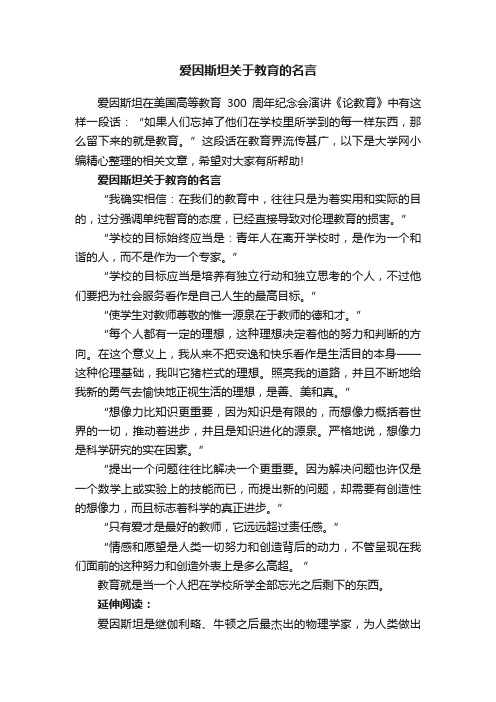
爱因斯坦关于教育的名言爱因斯坦在美国高等教育300周年纪念会演讲《论教育》中有这样一段话:“如果人们忘掉了他们在学校里所学到的每一样东西,那么留下来的就是教育。
”这段话在教育界流传甚广,以下是大学网小编精心整理的相关文章,希望对大家有所帮助!爱因斯坦关于教育的名言“我确实相信:在我们的教育中,往往只是为着实用和实际的目的,过分强调单纯智育的态度,已经直接导致对伦理教育的损害。
”“学校的目标始终应当是:青年人在离开学校时,是作为一个和谐的人,而不是作为一个专家。
”“学校的目标应当是培养有独立行动和独立思考的个人,不过他们要把为社会服务看作是自己人生的最高目标。
”“使学生对教师尊敬的惟一源泉在于教师的德和才。
”“每个人都有一定的理想,这种理想决定着他的努力和判断的方向。
在这个意义上,我从来不把安逸和快乐看作是生活目的本身——这种伦理基础,我叫它猪栏式的理想。
照亮我的道路,并且不断地给我新的勇气去愉快地正视生活的理想,是善、美和真。
”“想像力比知识更重要,因为知识是有限的,而想像力概括着世界的一切,推动着进步,并且是知识进化的源泉。
严格地说,想像力是科学研究的实在因素。
”“提出一个问题往往比解决一个更重要。
因为解决问题也许仅是一个数学上或实验上的技能而已,而提出新的问题,却需要有创造性的想像力,而且标志着科学的真正进步。
”“只有爱才是最好的教师,它远远超过责任感。
”“情感和愿望是人类一切努力和创造背后的动力,不管呈现在我们面前的这种努力和创造外表上是多么高超。
”教育就是当一个人把在学校所学全部忘光之后剩下的东西。
延伸阅读:爱因斯坦是继伽利略、牛顿之后最杰出的物理学家,为人类做出了无与伦比的贡献。
这位科学巨人和哲学大师对青年教育问题也有精辟的见解。
学校最终要造就什么样的人?爱因斯坦认为,不应该把学校简单看作是一种传授知识的场所。
他说,知识是死的.而学校却要为活人服务。
应当发展青年人那些有益于公共福利的品质和才能,一个由没有个人独创性和个人志愿的、规格统一的个人所组成的社会,将是一个没有发展可能的不幸的社会。
爱因斯坦《论教育》doc
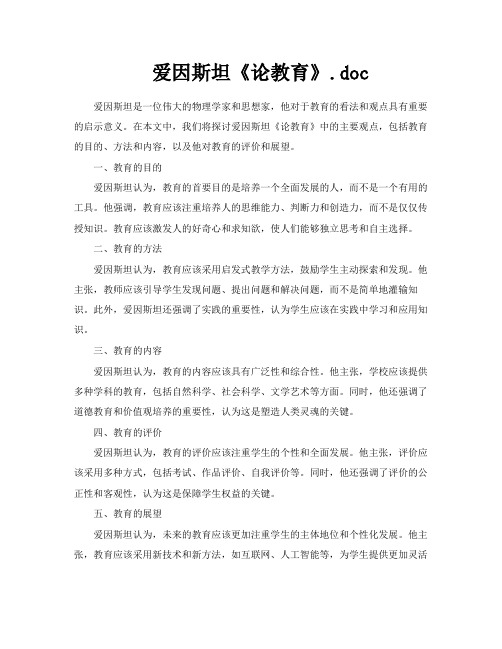
爱因斯坦《论教育》.doc 爱因斯坦是一位伟大的物理学家和思想家,他对于教育的看法和观点具有重要的启示意义。
在本文中,我们将探讨爱因斯坦《论教育》中的主要观点,包括教育的目的、方法和内容,以及他对教育的评价和展望。
一、教育的目的爱因斯坦认为,教育的首要目的是培养一个全面发展的人,而不是一个有用的工具。
他强调,教育应该注重培养人的思维能力、判断力和创造力,而不是仅仅传授知识。
教育应该激发人的好奇心和求知欲,使人们能够独立思考和自主选择。
二、教育的方法爱因斯坦认为,教育应该采用启发式教学方法,鼓励学生主动探索和发现。
他主张,教师应该引导学生发现问题、提出问题和解决问题,而不是简单地灌输知识。
此外,爱因斯坦还强调了实践的重要性,认为学生应该在实践中学习和应用知识。
三、教育的内容爱因斯坦认为,教育的内容应该具有广泛性和综合性。
他主张,学校应该提供多种学科的教育,包括自然科学、社会科学、文学艺术等方面。
同时,他还强调了道德教育和价值观培养的重要性,认为这是塑造人类灵魂的关键。
四、教育的评价爱因斯坦认为,教育的评价应该注重学生的个性和全面发展。
他主张,评价应该采用多种方式,包括考试、作品评价、自我评价等。
同时,他还强调了评价的公正性和客观性,认为这是保障学生权益的关键。
五、教育的展望爱因斯坦认为,未来的教育应该更加注重学生的主体地位和个性化发展。
他主张,教育应该采用新技术和新方法,如互联网、人工智能等,为学生提供更加灵活和便捷的学习方式。
同时,他还强调了终身学习的概念,认为这是适应社会发展的关键。
总之,爱因斯坦《论教育》中的观点对于现代教育具有重要的启示意义。
他认为教育的目的是培养全面发展的人,教育的方法应该是启发式的和实践性的,教育的内容应该具有广泛性和综合性,教育的评价应该注重学生的个性和全面发展,未来的教育应该更加注重学生的主体地位和个性化发展。
这些观点对于我们今天的教育的有着重要的指导作用。
在今天的实际教学中,我们可以借鉴爱因斯坦的教育思想,注重培养学生的思维能力和创造力。
爱因斯坦《论教育》
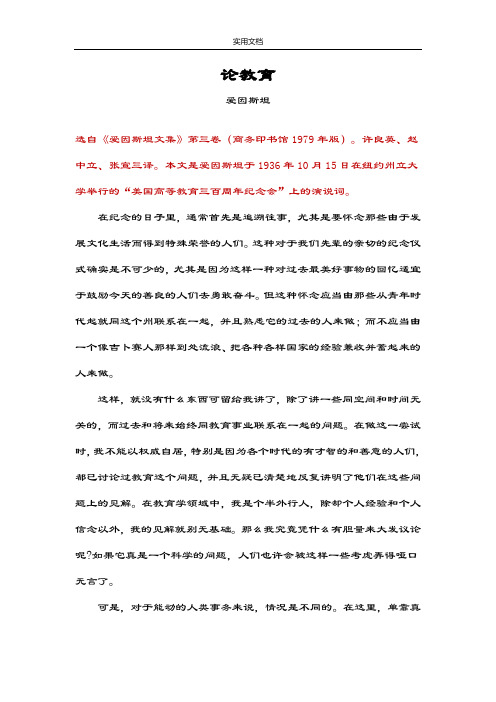
论教育爱因斯坦选自《爱因斯坦文集》第三卷(商务印书馆1979年版)。
许良英、赵中立、张宣三译。
本文是爱因斯坦于1936年10月15日在纽约州立大学举行的“美国高等教育三百周年纪念会”上的演说词。
在纪念的日子里,通常首先是追溯往事,尤其是要怀念那些由于发展文化生活而得到特殊荣誉的人们。
这种对于我们先辈的亲切的纪念仪式确实是不可少的,尤其是因为这样一种对过去最美好事物的回忆适宜于鼓励今天的善良的人们去勇敢奋斗。
但这种怀念应当由那些从青年时代起就同这个州联系在一起,并且熟悉它的过去的人来做;而不应当由一个像吉卜赛人那样到处流浪、把各种各样国家的经验兼收并蓄起来的人来做。
这样,就没有什么东西可留给我讲了,除了讲一些同空间和时间无关的,而过去和将来始终同教育事业联系在一起的问题。
在做这一尝试时,我不能以权威自居,特别是因为各个时代的有才智的和善意的人们,都已讨论过教育这个问题,并且无疑已清楚地反复讲明了他们在这些问题上的见解。
在教育学领域中,我是个半外行人,除却个人经验和个人信念以外,我的见解就别无基础。
那么我究竟凭什么有胆量来大发议论呢?如果它真是一个科学的问题,人们也许会被这样一些考虑弄得哑口无言了。
可是,对于能动的人类事务来说,情况是不同的。
在这里,单靠真理的知识是不够的,相反,如果要不失掉这种知识,就必须以不断的努力来使它经常更新。
它像一座矗立在沙漠上的大理石像,随时都有被流沙掩埋的危险。
为了使这座石像永远照耀在阳光之下,必须挥手不停地为它工作。
我也要出一臂之力。
学校向来是把传统的财富从一代传到下一代的最重要手段。
与过去相比,这种情况更加适合于今天。
由于经济生活现代化的发展,作为传统和教育的传递者的家庭已经削弱了。
因此,比起以前来,人类社会的延续和健康,要在更高程度上依靠学校。
有时,人们把学校简单地看做是一种工具,靠它来把最大量的知识传授给成长中的一代。
但这种看法是不正确的。
知识是死的;而学校却要为活人服务。
论教育(节选)
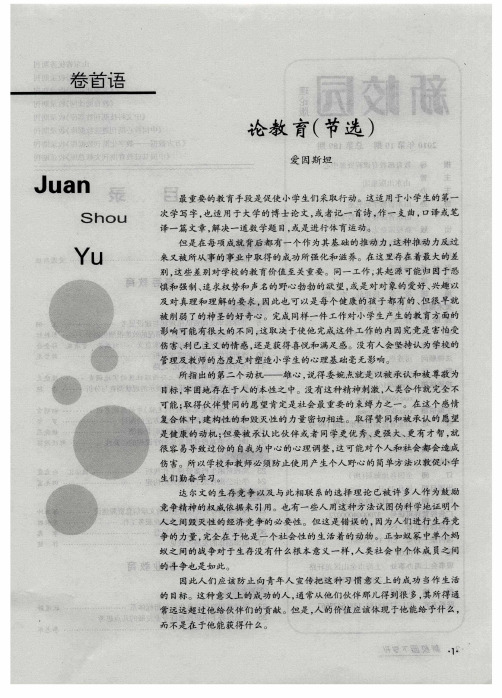
争的力量 , 完全在 于他是一个社会性的生活着的动物。正如蚁冢中单个蚂
蚁 之 间 的战 争对 于生存 没 有什 么根 本 意义 一 样 , 类社 会 中个体 成 员之 间 人
的 斗争 也是 如 此 。
因此 人 们 应 该 防 止 向 青年 人 宣传 把 这 种 习惯 意 义
达 尔文 的 生存 竞 争 以及 与 此相 联 系 的选择 理 论 已被 许 多人 作 为 鼓励 竞 争精 神 的权威 依 据 来 引用 。也 有一 些人 用这种 方 法试 图伪 科 学地证 明个
人 之 间毁 灭 性 的经 济竞 争 的 必要 性 。但 这 是错 误 的 , 因为人 们进 行 生 存 竞
“● ‘ ‘ 。 ‘
● 毫 : 0
所指 出的第二 个动机——雄心 , 说得委婉 点就是以被承认和被尊敬为
目 , 标 牢固地存在 于人 的本性之 中。没有这种精神刺激 , 类合作就完全不 人
可能; 取得伙伴赞 同的愿望肯定是社会最重要 的束缚力之一。在这个感情
复合 体 中, 建构 性 的和 毁 灭性 的 力 量 密切 相 连 。取得 赞 同和被 承认 的 愿 望
及对真理和理解 的要求 , 因此也可 以是每 个健康的孩子都有的、 但很早就 被 削弱 了的神圣的好奇心。完成同样一件工作对小学生产生的教育方面的
霉 誊
影响可能有很 大的不 同, 这取 决于使他 完成这件 工作的 内因究竟是 害怕受
伤 害 、 已主 义的情 感 , 是 获得 喜悦 和 满足 感 。没 有人 会 坚持认 为 学校 的 利 还 管理 及教 师 的 态度是 对 塑造 小 学生 的心理 基 础 毫无 影响 。
YU
来又被所从事的事业中取得的成功所强化和滋养。在这里存在着最大的差
爱因斯坦《论教育》.doc
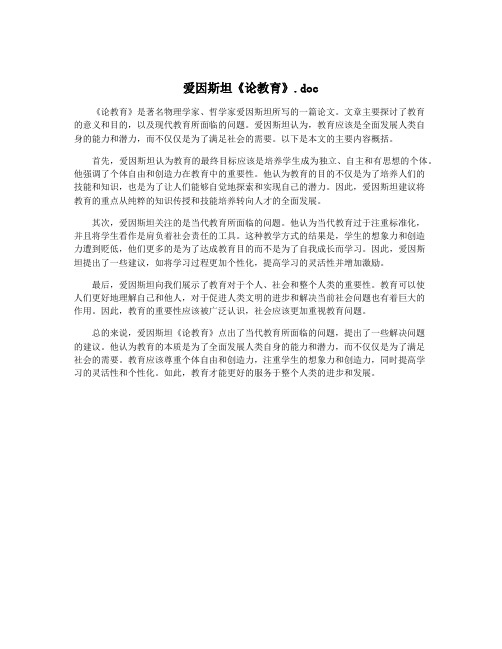
爱因斯坦《论教育》.doc《论教育》是著名物理学家、哲学家爱因斯坦所写的一篇论文。
文章主要探讨了教育的意义和目的,以及现代教育所面临的问题。
爱因斯坦认为,教育应该是全面发展人类自身的能力和潜力,而不仅仅是为了满足社会的需要。
以下是本文的主要内容概括。
首先,爱因斯坦认为教育的最终目标应该是培养学生成为独立、自主和有思想的个体。
他强调了个体自由和创造力在教育中的重要性。
他认为教育的目的不仅是为了培养人们的技能和知识,也是为了让人们能够自觉地探索和实现自己的潜力。
因此,爱因斯坦建议将教育的重点从纯粹的知识传授和技能培养转向人才的全面发展。
其次,爱因斯坦关注的是当代教育所面临的问题。
他认为当代教育过于注重标准化,并且将学生看作是肩负着社会责任的工具。
这种教学方式的结果是,学生的想象力和创造力遭到贬低,他们更多的是为了达成教育目的而不是为了自我成长而学习。
因此,爱因斯坦提出了一些建议,如将学习过程更加个性化,提高学习的灵活性并增加激励。
最后,爱因斯坦向我们展示了教育对于个人、社会和整个人类的重要性。
教育可以使人们更好地理解自己和他人,对于促进人类文明的进步和解决当前社会问题也有着巨大的作用。
因此,教育的重要性应该被广泛认识,社会应该更加重视教育问题。
总的来说,爱因斯坦《论教育》点出了当代教育所面临的问题,提出了一些解决问题的建议。
他认为教育的本质是为了全面发展人类自身的能力和潜力,而不仅仅是为了满足社会的需要。
教育应该尊重个体自由和创造力,注重学生的想象力和创造力,同时提高学习的灵活性和个性化。
如此,教育才能更好的服务于整个人类的进步和发展。
爱因斯坦论教育
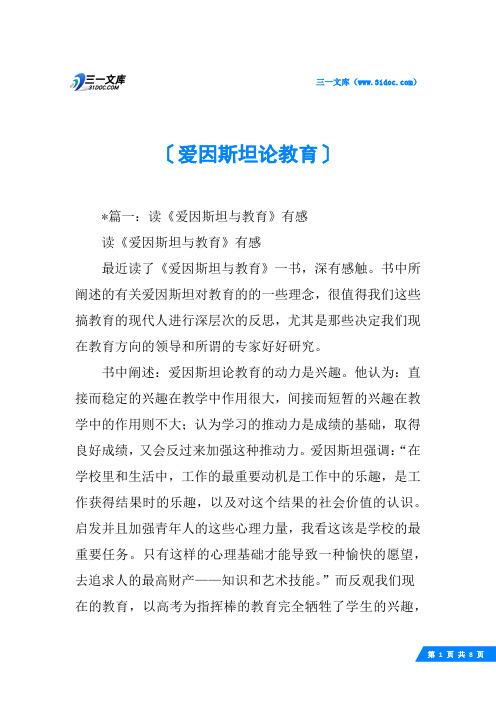
三一文库()〔爱因斯坦论教育〕*篇一:读《爱因斯坦与教育》有感读《爱因斯坦与教育》有感最近读了《爱因斯坦与教育》一书,深有感触。
书中所阐述的有关爱因斯坦对教育的的一些理念,很值得我们这些搞教育的现代人进行深层次的反思,尤其是那些决定我们现在教育方向的领导和所谓的专家好好研究。
书中阐述:爱因斯坦论教育的动力是兴趣。
他认为:直接而稳定的兴趣在教学中作用很大,间接而短暂的兴趣在教学中的作用则不大;认为学习的推动力是成绩的基础,取得良好成绩,又会反过来加强这种推动力。
爱因斯坦强调:“在学校里和生活中,工作的最重要动机是工作中的乐趣,是工作获得结果时的乐趣,以及对这个结果的社会价值的认识。
启发并且加强青年人的这些心理力量,我看这该是学校的最重要任务。
只有这样的心理基础才能导致一种愉快的愿望,去追求人的最高财产——知识和艺术技能。
”而反观我们现在的教育,以高考为指挥棒的教育完全牺牲了学生的兴趣,教育这项神圣的工作变成了像流水线一样重复的机械运动。
我们的学校领导最好取消所有的课外活动及所谓的小三门,我们的所谓主课老师最好是再多几节课时,学生最好是不吃不喝不拉的机器人。
看看我们的现状:学生体能在倒退;近视率达到70%以上;除了文化学习还有其他技能的学生不足5%。
太可悲了!听课-作业-听课-补课-练习,周而复始,培养出来的学生,还会有什么想象力和创造力!对于现代教育中扼杀学生的兴趣和好奇心的做法,爱因斯坦给予了辛辣的讽刺。
爱因斯坦写道:“现代的教学方法,竟然还没有把研究问题的神圣好奇心完全扼杀掉,真可以说是一个奇迹;因为这株脆弱的幼苗,除了需要鼓励以外,主要还需要自由;要是没有自由,它不可避免地会夭折。
认为用强制和责任感就能增进观察和探索的乐趣,那是一种严重的错误。
我想,即使是一头健康的猛兽,当它不饿的时候,如果有可能用鞭子强迫它不断地吞食,尤其是,当人们强迫喂给它吃的食物是经过适当选择的时候,也会使它丧失贪吃的习性的。
爱因斯坦论教育
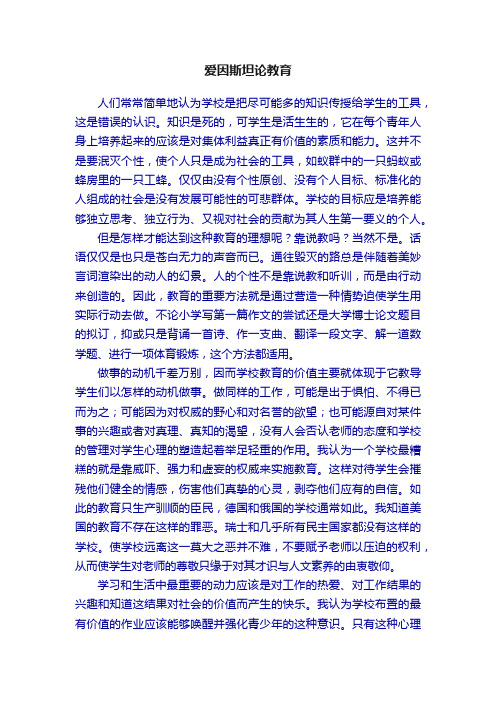
爱因斯坦论教育人们常常简单地认为学校是把尽可能多的知识传授给学生的工具,这是错误的认识。
知识是死的,可学生是活生生的,它在每个青年人身上培养起来的应该是对集体利益真正有价值的素质和能力。
这并不是要泯灭个性,使个人只是成为社会的工具,如蚁群中的一只蚂蚁或蜂房里的一只工蜂。
仅仅由没有个性原创、没有个人目标、标准化的人组成的社会是没有发展可能性的可悲群体。
学校的目标应是培养能够独立思考、独立行为、又视对社会的贡献为其人生第一要义的个人。
但是怎样才能达到这种教育的理想呢?靠说教吗?当然不是。
话语仅仅是也只是苍白无力的声音而已。
通往毁灭的路总是伴随着美妙言词渲染出的动人的幻景。
人的个性不是靠说教和听训,而是由行动来创造的。
因此,教育的重要方法就是通过营造一种情势迫使学生用实际行动去做。
不论小学写第一篇作文的尝试还是大学博士论文题目的拟订,抑或只是背诵一首诗、作一支曲、翻译一段文字、解一道数学题、进行一项体育锻炼,这个方法都适用。
做事的动机千差万别,因而学校教育的价值主要就体现于它教导学生们以怎样的动机做事。
做同样的工作,可能是出于惧怕、不得已而为之;可能因为对权威的野心和对名誉的欲望;也可能源自对某件事的兴趣或者对真理、真知的渴望,没有人会否认老师的态度和学校的管理对学生心理的塑造起着举足轻重的作用。
我认为一个学校最糟糕的就是靠威吓、强力和虚妄的权威来实施教育。
这样对待学生会摧残他们健全的情感,伤害他们真挚的心灵,剥夺他们应有的自信。
如此的教育只生产驯顺的臣民,德国和俄国的学校通常如此。
我知道美国的教育不存在这样的罪恶。
瑞士和几乎所有民主国家都没有这样的学校。
使学校远离这一莫大之恶并不难,不要赋予老师以压迫的权利,从而使学生对老师的尊敬只缘于对其才识与人文素养的由衷敬仰。
学习和生活中最重要的动力应该是对工作的热爱、对工作结果的兴趣和知道这结果对社会的价值而产生的快乐。
我认为学校布置的最有价值的作业应该能够唤醒并强化青少年的这种意识。
论教育 爱因斯坦
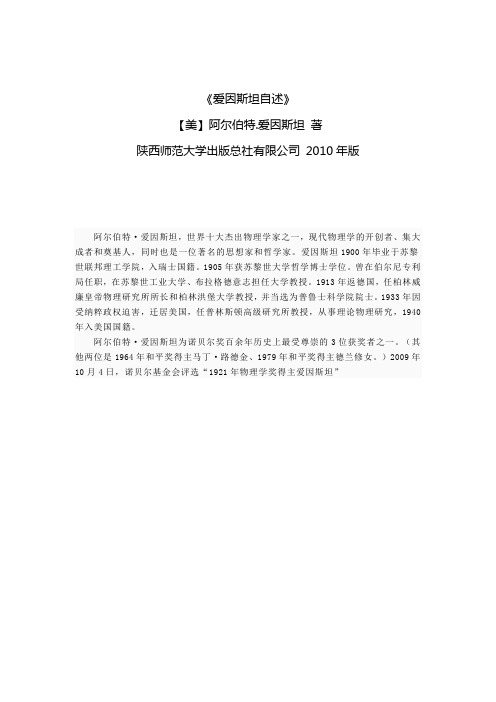
《爱因斯坦自述》【美】阿尔伯特.爱因斯坦著陕西师范大学出版总社有限公司 2010年版阿尔伯特·爱因斯坦,世界十大杰出物理学家之一,现代物理学的开创者、集大成者和奠基人,同时也是一位著名的思想家和哲学家。
爱因斯坦1900年毕业于苏黎世联邦理工学院,入瑞士国籍。
1905年获苏黎世大学哲学博士学位。
曾在伯尔尼专利局任职,在苏黎世工业大学、布拉格德意志担任大学教授。
1913年返德国,任柏林威廉皇帝物理研究所所长和柏林洪堡大学教授,并当选为普鲁士科学院院士。
1933年因受纳粹政权迫害,迁居美国,任普林斯顿高级研究所教授,从事理论物理研究,1940年入美国国籍。
阿尔伯特·爱因斯坦为诺贝尔奖百余年历史上最受尊崇的3位获奖者之一。
(其他两位是1964年和平奖得主马丁·路德金、1979年和平奖得主德兰修女。
)2009年10月4日,诺贝尔基金会评选“1921年物理学奖得主爱因斯坦”●A=X+Y+Z A是成功,X是努力工作,Y是懂得休息,Z是少说废话●“不曾犯错的人,是因为他从来不曾尝试新事物”●“想象力比知识更重要。
因为知识是有限的,而想象力却能畅游整个世界”●“你必须去学习游戏规则。
然后,你还要比别人玩得更好。
”●“任何回忆都会多少染上眼前的色彩”●“大多数人花毕生时间去追逐一些毫无价值的希望与努力”●“我会对所有权威产生怀疑。
敢于对任何社会环境里既存的信念完全吃一种怀疑态度。
”●“有一个不可知的世界在我们之外存在着,它的存在并不取决于我们人类的主观意愿。
尽管它是一个高深而永恒的谜,但值得庆幸的是,我们人类至少可以部分地用观察和思维触及到它,这个世界深具魅力,有如争求自由、得到解放一样。
吸引我们的凝视深思。
而我不久就注意到,在专心从事这项事业中,许多我所尊敬和钦佩的人找到了内心的自由和安详。
我总是会有意无意地浮现一个最高目标,那就是借助一切既有力量与条件在向我们提供的一切可能的范围里,我们从思想上掌握这个外部世界。
- 1、下载文档前请自行甄别文档内容的完整性,平台不提供额外的编辑、内容补充、找答案等附加服务。
- 2、"仅部分预览"的文档,不可在线预览部分如存在完整性等问题,可反馈申请退款(可完整预览的文档不适用该条件!)。
- 3、如文档侵犯您的权益,请联系客服反馈,我们会尽快为您处理(人工客服工作时间:9:00-18:30)。
论教育爱因斯坦选自《爱因斯坦文集》第三卷(商务印书馆1979年版)。
许良英、赵中立、张宣三译。
本文是爱因斯坦于1936年10月15日在纽约州立大学举行的“美国高等教育三百周年纪念会”上的演说词。
在纪念的日子里,通常首先是追溯往事,尤其是要怀念那些由于发展文化生活而得到特殊荣誉的人们。
这种对于我们先辈的亲切的纪念仪式确实是不可少的,尤其是因为这样一种对过去最美好事物的回忆适宜于鼓励今天的善良的人们去勇敢奋斗。
但这种怀念应当由那些从青年时代起就同这个州联系在一起,并且熟悉它的过去的人来做;而不应当由一个像吉卜赛人那样到处流浪、把各种各样国家的经验兼收并蓄起来的人来做。
这样,就没有什么东西可留给我讲了,除了讲一些同空间和时间无关的,而过去和将来始终同教育事业联系在一起的问题。
在做这一尝试时,我不能以权威自居,特别是因为各个时代的有才智的和善意的人们,都已讨论过教育这个问题,并且无疑已清楚地反复讲明了他们在这些问题上的见解。
在教育学领域中,我是个半外行人,除却个人经验和个人信念以外,我的见解就别无基础。
那么我究竟凭什么有胆量来大发议论呢?如果它真是一个科学的问题,人们也许会被这样一些考虑弄得哑口无言了。
可是,对于能动的人类事务来说,情况是不同的。
在这里,单靠真理的知识是不够的,相反,如果要不失掉这种知识,就必须以不断的努力来使它经常更新。
它像一座矗立在沙漠上的大理石像,随时都有被流沙掩埋的危险。
为了使这座石像永远照耀在阳光之下,必须挥手不停地为它工作。
我也要出一臂之力。
学校向来是把传统的财富从一代传到下一代的最重要手段。
与过去相比,这种情况更加适合于今天。
由于经济生活现代化的发展,作为传统和教育的传递者的家庭已经削弱了。
因此,比起以前来,人类社会的延续和健康,要在更高程度上依靠学校。
有时,人们把学校简单地看做是一种工具,靠它来把最大量的知识传授给成长中的一代。
但这种看法是不正确的。
知识是死的;而学校却要为活人服务。
它应当发展青年人中那些有益于公共福利的品质和才能。
但这并不是意味着个性应当消灭,而个人只变成像一只蜜蜂或蚂蚁那样仅仅是社会的一种工具。
因为一个由没有个人独创性和个人志愿的规格统一的个人所组成的社会,将是一个没有发展可能的不幸的社会。
相反地,学校的目标应当是培养有独立行动和独立思考的个人,不过他们要把为社会服务看做是自己人生的最高目的。
就我所能判断的范围来说,英国学校制度是最接近于实现这种理想的。
但是人们应当怎样来努力达到这种理想呢?是不是要用道德说教来实现这个目标呢?完全不是。
言词是并且永远是空洞的,而且通向地狱的道路总是伴随着理想的空谈。
但是人格决不是靠所听到的和所说出的言语,而是靠劳动和行动来形成的。
因此,最重要的教育方法总是鼓励学生去实际行动。
这对于初学的儿童第一次学写字是如此,对于大学里写博士学位论文也是如此,就是在简单地默记一首诗,写一篇作文,解释和翻译一段课文,解一道数学题目,或者进行体育运动锻炼,也都无不如此。
但是在每项成绩背后都有着一种推动力,它是成绩的基础,反过来,这种推动力也通过任务的完成而得到加强和滋养。
在这里存在着非常大的差别,这种差别同学校的教育准则的关系极为重大。
做同样的工作,它的出发点,可以是恐怖和强制,可以是追求威信和荣誉的好胜心,也可以是对于对象的诚挚的兴趣和追求真理与理解的愿望,因而也可以是每个健康儿童都具有的天赋的好奇心,只不过这种好奇心往往很早就衰退了。
同样一件工作的完成,对于学生所产生的教育影响可以很不相同,这要看推动这项工作的主因究竟是怕受到损害的恐惧,是自私的欲望,还是对快乐和满足的追求。
没有人会认为学校的管理和教师的态度对塑造学生的心理基础会没有影响。
我以为,对于学校来说,最坏的事是,主要靠恐吓、暴力和人为的权威这些办法来进行工作。
这种做法摧残学生的健康的感情、诚实和自信;它制造出来的是顺从的人。
这样的学校在德国和俄国成为惯例,那是没有什么可奇怪的。
我知道在美国这个国家里,学校中不存在这种最坏的祸害;在瑞士,以及差不多在一切民主管理的国家里也都如此。
要使学校不受到这种一切祸害中最坏的祸害的侵袭,那是比较简单的。
教师使用的强制手段要尽可能地少,学生对教师的尊敬的唯一源泉在于教师的德和才。
第二项动机是好胜心,或者说得婉转点,是期望得到赞许和尊重,它根深蒂固地存在于人的本性中。
要是没有这种精神刺激,人类合作就完全不可能;一个人希望得到他的同类赞许的愿望,肯定是社会对他的最大约束力之一。
但在这种复杂的感情中,建设性的力量同破坏性的力量密切地交织在一起。
想要得到赞许和表扬的愿望,本来是一种健康的动机;但如果要求别人承认自己比同伴或者同学更高明、更强,或者更有才智;那就容易在心理上产生唯我独尊的态度,这无论对个人还是对社会都是有害的。
因此,学校和教师必须防范使用那种容易产生个人野心的简单办法去引导学生从事辛勤的工作。
达尔文的生存竞争以及同它有关的选择的理论,被很多人引证来作为鼓励竞争精神的根据。
有些人还以这样的办法试图伪科学地证明个人竞争这种破坏性经济斗争的必然性。
但这是错误的,因为人在生存竞争中的力量全在于他是一个过着社会生活的动物。
正像在一个蚂蚁窝里的个别蚂蚁之间的交战说不上什么是为生存所必需的,人类社会中各个成员之间的情况也是这样。
因此,人们应当防止向青年人鼓吹那种以习俗意义上的成功作为人生的目标。
因为一个获得成功的人,从他的同胞那里所取得的,总是无可比拟地超过他对他们所做的贡献。
然而看一个人的价值,应当看他贡献什么,而不应当看他取得什么。
在学校里和在生活中,工作的最重要动机是工作中的乐趣,是工作获得结果时的乐趣,以及对这个结果的社会价值的认识。
启发并且加强青年人的这些心理力量,我看这该是学校的最重要任务。
只有这样的心理基础才能导致一种愉快的愿望,去追求人的最高财产──知识和艺术技能。
要启发这种创造性的心理能力,当然不像使用强力或者唤起个人好胜心那样容易,但它是更有价值的。
关键在于发展孩子对游戏的天真爱好和获得赞许的天真愿望,并且把孩子引向对于社会很重要的领域;这种教育主要是建立在希望得到有成效的活动能力和社会认可的愿望之上的。
如果学校从这样的观点出发,工作很成功,那么它就会受到成长中的一代的高度尊敬,学校所规定的作业就会被当做一种礼物来领受。
我知道有些儿童就对在学时间比对假期还要喜爱。
这样一种学校要求教师在他的本职工作上成为一种艺术家。
为着要在学校中得到这种精神,我们能够做些什么呢?对于这个问题,正像无法使人永葆健康一样,并不存在包医百病的万灵丹,但是还有某些必要的条件是可以满足的。
首先,教师应当是在这样的学校里成长起来;其次,在选择教材和使用教学方法上,应当给教师以广泛的自由,因为强制和外界压力无疑也会扼杀他在安排他的工作时的乐趣。
如果你们是一直在用心地听取我的想法,有一件事也许你们会觉得奇怪。
我所讲的完全是,依照我的见解,应当以怎样的精神来教导青少年。
但是我既没有讲到课程设置,也没有讲到教学方法。
究竟应当以文科为主,还是应当以理科专业教育为主呢?对这个问题,我的回答是:照我的见解,这一切都是次要的。
如果青年人通过体操和走路训练了他的肌肉和体力的耐劳性,以后他就会适合任何体力劳动。
思想的训练以及智力和手艺方面的技能锻炼也类似这样。
因此,有个才子讲得不错,他对教育下这样一个定义:“如果一个人忘掉了他在学校里所学到的每一样东西,那么留下来的就是教育。
”就由于这个理由,对于古典文史教育的拥护者同注重自然科学教育的人之间的抗争,我一点也不想偏袒哪一方。
另一方面,我也要反对认为学校必须直接教授那些在以后生活中要直接用到的专业知识和技能这种观点。
生活所要求的东西太多种多样了,不大可能允许学校采取这样的专门训练。
除开这一点,我还认为应当反对把个人当做死的工具来对待。
学校的目标始终应当是:青年人在离开学校时,是作为一个和谐的人,而不是作为一个专家。
照我的见解,在某种意义上,即使对技术学校来说,这也是正确的,尽管技术学校的学生将要从事的是一种完全确定的专门职业。
发展独立思考和独立判断的一般能力,应当始终放在首位,而不应当把获得专业知识放在首位。
如果一个人掌握了他的学科的基础理论,并且学会了独立地思考和工作,他必定会找到他自己的道路,而且比起那种主要以获得细节知识为其培训内容的人来,他一定会更好地适应进步和变化。
最后,我要再一次强调一下,这里所讲的虽然多少带点绝对肯定的样子,却并不要求它比一个人的个人见解具有更多的意义,这种见解所根据的只不过是他自己在做学生和当教师时所积累起来的个人经验而已。
阅读指要这篇演讲表现了爱因斯坦在教育问题上的一些真知灼见。
他承认学校在现代社会里的重要性,但否定仅把学校视为传递知识的工具的看法;他认为学校教育的目标,应该是“培养有独立行动和独立思考的个人”,并且“他们要把为社会服务看做是自己人生的最高目的”,这是针对日渐偏重书本知识并趋向实用功利的学校教育现实情况而发的。
怎样才能实现学校教育的目标?爱因斯坦提出了一些教育观念:鼓励学生去实际行动、尽可能少用强制手段、培养学生树立正确的工作动机。
随后,他又对教师和教学内容方面表达了意见。
演讲从头至尾,爱因斯坦都是以一位富有阅历的长者身份,十分诚恳地把“个人经验和个人信念”讲出来,显示了他作为一位伟大科学家的人格魅力。
他的忠告至今仍具有现实意义。
自述(节选)爱因斯坦当我还是一个相当早熟的少年的时候,我就已经深切地意识到,大多数人终生无休止地追逐的那些希望和努力是毫无价值的。
而且,我不久就发现了这种追逐的残酷,这在当年较之今天是更加精心地用伪善和漂亮的字句掩饰着的。
每个人只是因为有个胃,就注定要参与这种追逐。
而且,由于参与这种追逐,他的胃是有可能得到满足的;但是,一个有思想、有感情的人却不能由此而得到满足。
这样,第一条出路就是宗教,它通过传统的教育机关灌输给每一个儿童。
因此,尽管我是完全没有宗教信仰的(犹太人)双亲的儿子,我还是深深地信仰宗教,但是,这种信仰在我12岁那年就突然中止了。
由于读了通俗的科学书籍,我很快就相信,《圣经》里的故事有许多不可能是真实的。
其结果就是一种真正狂热的自由思想,并且交织着这样一种印象:国家是故意用谎言来欺骗年轻人的;这是一种令人目瞪口呆的印象。
这种经验引起我对所有权威的怀疑,对任何社会环境里都会存在的信念完全抱一种怀疑态度,这种态度再也没有离开过我,即使在后来,由于更好地搞清楚了因果关系,它已失去了原有的尖锐性时也是如此。
我很清楚,少年时代的宗教天堂就这样失去了,这是使我自己从“仅仅作为个人”的桎梏中,从那种被愿望、希望和原始感情所支配的生活中解放出来的第一个尝试。
在我们之外有一个巨大的世界,它离开我们人类而独立存在,它在我们面前就像一个伟大而永恒的谜,然而至少部分地是我们的观察和思维所能及的。
